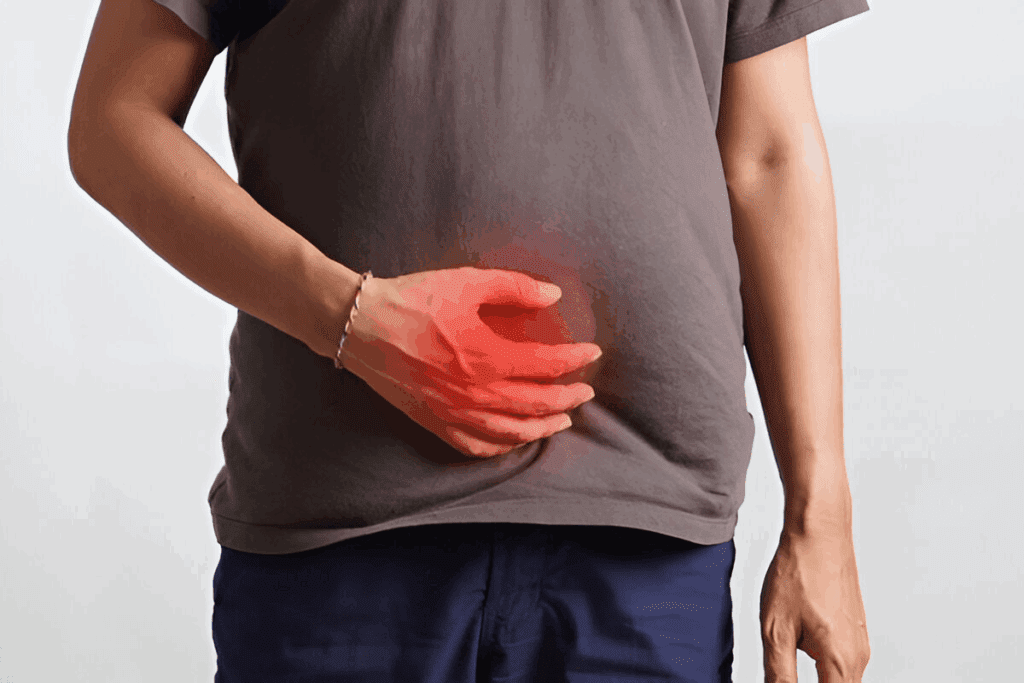Last Updated on November 26, 2025 by Bilal Hasdemir

Constipation is a common problem for many after surgery, including those who’ve had a hernia operation. Anesthesia, pain meds, and less activity play a big role in this issue.
About 30-50 percent of patients get constipated after hernia surgery. This can make recovery slower and more uncomfortable. Knowing why it happens and how to fix it is key for a better recovery.

After hernia surgery, many patients face constipation. This issue is caused by several factors that affect bowel movements.
Anesthesia slows down bowel movements after surgery. Anesthetic drugs can temporarily stop the intestines from working, causing constipation. This effect is usually short-lived but can affect recovery.
Pain meds, like opioids, often cause constipation. Opioids slow down the intestines, making stool harder and drier. This makes recovery from hernia surgery harder.
Less physical activity after surgery also leads to constipation. Not moving much slows down bowel movements. Doctors suggest slowly starting to move more to help.
These factors can greatly affect bowel movements after hernia surgery. Knowing why helps manage and prevent constipation during recovery.
By understanding these causes, patients and doctors can work together to reduce constipation risks after hernia surgery.

Constipation is common after hernia surgery. It’s important to know the signs to manage it well. Pay attention to changes in bowel movements and other symptoms to tackle constipation quickly.
After hernia surgery, bowel movements might change. It’s key to tell normal from concerning changes. Normal changes include temporary constipation or irregular bowel movements due to anesthesia and pain meds. But, concerning changes are severe constipation lasting long, with symptoms like abdominal pain or bloating.
“Keep a close eye on your bowel movements after surgery,” advises Medical Expert, a top surgeon. “If you see unusual symptoms or constipation doesn’t go away, see your healthcare provider.”
It’s important to know when to get medical help. Contact your healthcare provider if you have:
These signs might mean you need urgent medical care.
It’s vital to tell constipation from possible surgical complications. While constipation is uncomfortable, serious issues like infection or bowel obstruction need quick action. Signs of complications include fever, severe pain, redness, swelling, or discharge at the incision site. If you’re not sure about your symptoms, always check with your healthcare provider.
Understanding constipation symptoms after hernia surgery and knowing when to get help can make recovery easier. It also lowers the chance of serious complications.
After hernia surgery, many people wonder if it’s okay to strain during bowel movements. This is a valid concern because straining can put pressure on the repair site. It’s important to know the risks and learn how to move without putting too much pressure on the area.
Straining can increase pressure in your abdomen, which might harm the hernia repair. It’s advised to avoid heavy lifting for at least four weeks after surgery. This helps the repair site heal enough to handle everyday stresses. But, straining can increase pressure on the repair site.
To lower this risk, eating foods high in fiber can help prevent constipation. This means you won’t have to strain as much. Also, learning the right way to move your bowels can help avoid putting too much pressure on the repair site.
Using the right posture can help you move without straining. Try using a footstool to lift your feet and make it easier to move your bowels. This can help you avoid straining and put less pressure on the repair site.
Some good techniques include:
Supporting your incision site can make bowel movements more comfortable. Place a hand or a pillow against the incision site to support it and reduce discomfort. This can be really helpful in the first few weeks after surgery.
By knowing the risks and using the right techniques, you can make bowel movements more comfortable and support your recovery. Always talk to your healthcare provider for advice on managing bowel movements after surgery.
One of the best ways to fight constipation after hernia surgery is to eat more fiber. Foods high in fiber make stool softer. This makes it easier to pass and lessens the strain on your surgery area.
Eating foods high in fiber can really help you recover. Include bran, beans, apples, pears, prunes, squash, sweet potatoes, spinach, and collard greens in your diet. These foods are not only high in fiber but also packed with nutrients that boost your health.
It’s important to increase fiber slowly to avoid bloating and gas. Start with a small amount of high-fiber foods in your meals. Then, slowly add more. This lets your body adjust without discomfort.
A good meal plan can help you get enough fiber. Here’s a sample:
By adding these high-fiber foods and meal plans to your diet, you can manage constipation after hernia surgery. This also supports your overall recovery.
Staying hydrated is a simple yet effective way to alleviate constipation after hernia surgery. Adequate fluid intake helps soften stool, making it easier to pass and reducing the strain on your incision site.
Drinking enough water is key to preventing constipation. It’s advised to drink at least four glasses of water daily. Increasing fluid intake can greatly improve bowel movements and overall recovery.
While water is the best beverage for hydration, other fluids can also aid bowel health. Herbal teas, such as peppermint or chamomile tea, can help relax the digestive system and promote bowel movements. Clear broths also provide essential fluids and electrolytes.
To ensure adequate hydration, creating a hydration schedule can be helpful. Start by setting a goal to drink a certain amount of water at specific times of the day. For example, drinking a glass of water as soon as you wake up and before each meal can help establish a routine. Monitoring your urine output is also a good way to check if you’re hydrated; it should be pale yellow or clear.
By incorporating these hydration strategies into your recovery plan, you can help prevent constipation and support your overall healing process.
Effective medications can help with constipation after hernia surgery. A mix of treatments is often needed. Medication is a key part of recovery for many.
Stool softeners are often the first choice for constipation after surgery. Docusate sodium (Colace) makes stool softer and easier to pass. This helps reduce strain on the surgical area.
Docusate calcium works the same way as Docusate sodium. These are safe for use after surgery and help manage constipation.
Some patients need a laxative in addition to stool softeners. Psyllium husk (Metamucil) and Methylcellulose (Citrucel) are fiber-based laxatives. They help with regular bowel movements and are gentle.
Start with a low dose of laxative and follow the instructions. Stay well-hydrated to avoid side effects like bloating or gas.
If OTC options don’t work, talk to your doctor about prescription medications. Linaclotide (Linzess) and Lubiprostone (Amitiza) can increase bowel movements and soften stool.
Use these medications only as directed by a healthcare provider. They can have side effects and aren’t for everyone. Always discuss your medical history and other medications with your doctor.
After hernia surgery, adding physical activity to your routine can boost bowel function. Gentle exercises can help move your digestive system, leading to regular bowel movements. It’s key to listen to your doctor about when to start exercising, as it varies based on surgery type and recovery pace.
Walking is a top choice for post-hernia surgery exercises. It’s easy on the incision site, perfect for early recovery. Start with short walks, like 5-10 minutes, and increase as you get stronger. Walking boosts bowel movements by improving blood flow and muscle contractions.
Other than walking, there are gentle exercises that can help without straining your incision. These include:
These movements enhance circulation and stimulate abdominal muscles, aiding bowel movements.
Creating a progressive activity plan is vital for recovery. This means:
By having a structured plan, you can safely enhance bowel function and recovery.
Abdominal massage is a gentle way to help digestion and ease constipation after hernia surgery. It involves soft manipulation of the abdominal muscles. This helps move the bowels and makes recovery more comfortable.
When doing self-massage after hernia surgery, be gentle and avoid the surgical area at first. Use your fingertips for soft, circular motions around your belly. As you get more comfortable, you can apply more pressure.
There are specific spots on your belly that can help with digestion. These are around your navel and lower belly. Massaging these spots can encourage bowel movements.
While abdominal massage is helpful, there are times to skip it. These include:
Always talk to your healthcare provider before trying new therapies like abdominal massage. They can make sure it’s safe for you.
Optimal bathroom positioning is key after hernia surgery. It helps reduce discomfort and strain on the surgical site. This makes bowel movements easier and less painful.
Using a footstool during bowel movements can align the rectum. It makes passing stools easier. Placing a footstool under your feet while on the toilet can elevate your knees above your hips. This simulates a squatting position that is more conducive to bowel movements.
Maintaining a comfortable position on the toilet is key. Leaning forward and supporting your elbows on your knees can help reduce pressure on your abdomen. Keeping your back straight and avoiding slouching also helps.
A comfortable bathroom environment is important too. It reduces stress and promotes relaxation during bowel movements. Some people find it helpful to use a warm bath or a heating pad on the abdomen before attempting a bowel movement. This stimulates bowel activity and relaxation.
By implementing these strategies, individuals can create a more conducive environment for bowel movements. This reduces the discomfort associated with constipation after hernia surgery.
Natural remedies and supplements can help with constipation after hernia surgery. They work alongside traditional treatments to improve bowel movements and gut health.
Some herbal teas have natural laxative properties. Senna tea is effective but should be used carefully. Peppermint tea and chamomile tea are gentler and can help with digestion.
Probiotics are good bacteria for a healthy gut. They can help after surgery. Foods like yogurt or kefir, or supplements, can be good. Always talk to a doctor before starting new supplements.
Choosing safe supplements is key during recovery. Psyllium husk is a fiber supplement that helps with bowel movements. Always check with a doctor before trying new supplements.
| Natural Remedy | Benefits | Precautions |
| Senna Tea | Natural laxative, stimulates bowel movements | Use under medical guidance, may lead to dependency |
| Peppermint Tea | Relaxes digestive system, promotes regularity | Generally safe, but may interact with medications |
| Probiotics | Restores gut flora balance, eases constipation | Consult healthcare provider before starting supplements |
| Psyllium Husk | Softens stool, promotes regularity | Needs plenty of water, consult healthcare provider |
Creating a consistent bathroom routine can help with constipation after hernia surgery. A regular schedule for bowel movements helps regulate digestion and reduces discomfort.
Timing is key in a regular bathroom routine. Try to have a bowel movement at the same time each day. Many find their bowel is most active after meals, like breakfast.
For example, make using the bathroom a morning routine. Give yourself enough time for bowel movements without rushing.
Environmental cues can help with a regular routine. Make your bathroom comfortable and consistent to signal it’s time to go. This could mean using a footstool or keeping the bathroom warm.
It’s important to listen to your body’s signals and act on them. Ignoring the urge to go can cause constipation. By responding quickly, you can keep bowel movements regular.
Being aware of your body’s signals and adding them to your routine can make it better. You might need to adjust the timing or environment based on how you feel.
Stress and constipation are closely linked. Knowing this can help patients improve their bowel health after surgery. Stress can make constipation worse. So, managing stress is key to recovery.
Anxiety and stress slow down bowel movements. They affect the digestive system’s function. When stressed, our body’s “fight or flight” response kicks in, reducing blood flow to the digestive system.
This reduction in blood flow can slow down bowel movements, leading to constipation. Understanding how stress affects our body is important. Stress hormones like cortisol can change gut bacteria and slow down the intestines. Regular stress can cause chronic constipation if not managed.
Relaxation techniques can greatly help digestive health. Deep breathing exercises, progressive muscle relaxation, and meditation can lower stress. This promotes a healthier digestive system.
Mindfulness practices are also important for managing stress and bowel health. Being mindful helps patients recognize and manage stress. This can reduce its impact on digestion.
Effective mindfulness practices include:
By adding these practices to their daily routine, patients can better manage stress. This can help alleviate constipation and support digestive health during recovery.
Many patients worry about bowel function after hernia surgery. Constipation can be uncomfortable but can be managed. By making dietary changes, staying hydrated, and doing gentle exercises, patients can help.
Eating foods high in fiber and drinking enough water helps. Safe exercises also encourage bowel movements. Techniques like abdominal massage and the right bathroom position can also help.
It’s key for patients to work with their healthcare provider. Together, they can create a plan to manage constipation. With the right steps, patients can reduce discomfort and recover smoothly. Combining lifestyle changes and medication can help achieve relief from hernia constipation.
After hernia surgery, constipation can be caused by several factors. Anesthesia and pain meds slow down your bowel. Also, not moving much can make it harder to go.
To ease constipation, eat more fiber and drink lots of water. You might also need stool softeners or laxatives. Gentle exercise and abdominal massage can help too.
No, it’s not safe to push hard during bowel movements after surgery. This can harm the repair site. Instead, support your incision and find a comfortable position.
Foods high in fiber can prevent constipation. Include fruits, veggies, whole grains, and legumes in your diet. Slowly adding more fiber can also help avoid bloating.
Drink plenty of water and other fluids that help with bowel movements. Prune juice or warm liquids are good choices. The right amount of fluid varies, but aim to stay hydrated.
Yes, you can use laxatives after surgery, but choose safe ones and follow the dosage. Always talk to your doctor before taking any medication.
Gentle activities like walking can help. Abdominal massage and the right bathroom position also aid in bowel movements.
Yes, herbal teas and probiotics can help. Some natural supplements might also work. But, always check with your doctor before trying new remedies.
Stress can cause constipation. Try relaxation techniques like deep breathing, meditation, or yoga. These can help your digestive health.
If you have severe constipation, pain, or other symptoms, reach out to your doctor. They can offer guidance and support.
Subscribe to our e-newsletter to stay informed about the latest innovations in the world of health and exclusive offers!